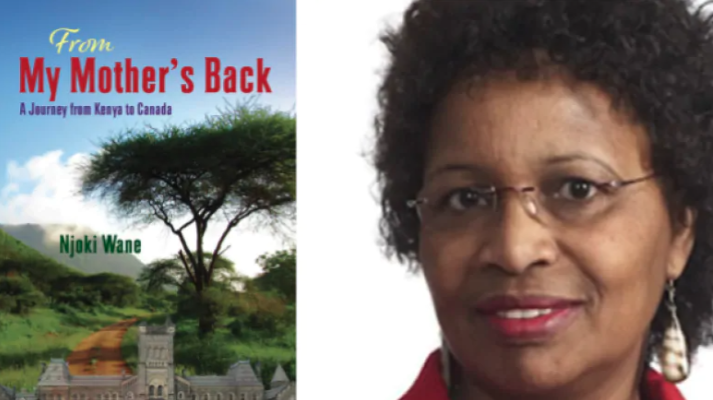The 2021 Creative Non-Fiction Contest judge is award-winning educator, researcher, and writer, Dr. Njoki Wane. Dr. Wane has consistently used her positions in academia and policy-making to advance an agenda of equity and an intersectional approach. She is also the author of the memoir, From My Mother’s Back, which explores her African identity and sense of belonging, particularly through her relationship with her mother. Dr. Wane currently serves as Chair in the Department of Social Justice Education at the Ontario Institute for Studies in Education (OISE).
You can read our conversation below to find out what moves her as both a writer and reader, and more. This year’s Creative Non-Fiction Contest closes June 6th, 2021.
[This interview was conducted via email and video call.]
ROOM: This year you will be judging our 2021 Creative Non-Fiction contest— how exciting! How do you approach looking at pieces of creative non-fiction?
DR. NJOKI WANE: My approach in looking at pieces of creative non-fiction is based on the following: The setting of the creative piece; does the setting give the reader or the audience any ideas as to why the author conceptualized this work? Are the goals of the piece clearly articulated at the beginning of the work? Who is the target audience? I also look at the themes – what are the dominant themes or themes, and how are these expounded within the work. What is the message to individuals and society? What lessons does the author want the individuals to take as they close the book?
ROOM: What kinds of writing excites you?
DR. WANE: What excites me most is fiction – I usually identify with one of the characters. This is my way of escaping to another world.
ROOM: Sometimes folks disagree on the exact definition of “creative non-fiction.” How would you describe it?
DR. WANE: I can’t really give one answer. People write depending on what they are appealing to and from their own understanding of what that means. When I wrote my book, I met with my publisher, who said, “you have to name the schools you went to. Don’t give places fictitious names. Make it real, and then you can go back and forth in history. Make it real.”
ROOM: You wrote a memoir, “From My Mother’s Back,” that deals with the ideas of home and identity, and you are also a scholar that focuses on social justice, Black feminism and African spirituality. Are there particular mediums/genres of writing that are better suited to communicate specific ideas? Do you prefer to use one or the other?
DR. WANE: I prefer to use different mediums. Writing for me – especially non-academic writing is healing. I get to be myself. I am authentic as I write.
Anyone can be a creative non-fiction writer – just go for it.
ROOM: Are there things that creative non-fiction can accomplish that academic writing cannot, and vice versa?
DR. WANE: I believe creative non-fiction speaks to a wider audience. Additionally, the messages convey different meanings to individuals or societies.
ROOM: People are reading to explain the times that we’re in and, on some level, to escape it. What sort of responsibilities do you think writers are feeling right now?
DR. WANE: Right now, there is some level of desperation, loneliness, and people wishing to engage in writing should focus on inspiring people; and focusing on the inner self. I’m currently drafting my new book, and the book is about joy. When we talk about joy, joy means different things to different people. I am reflecting in terms of what joy meant to me before I lost it. And my responsibility to the people who will be reading this book is to hopefully let them reflect back to the moments in their life where there was joy, creating some semblance of joyfulness, instead of living in pain, living in fear.
ROOM: What are some of your favourite creative-non fiction reads?
DR. WANE: Some of my favourite creative non-fiction are those that challenge my mind, my mental well-being and the power of the unseen. I have “The Power Of Your Subconscious Mind” by Joseph Murphy on my shelf. It’s almost torn because I’ve read it so much. I also have “You Are Therefore I Am” by Satish Kumar. It’s written by somebody from India, and connecting with nature, reflecting on their growing up. The author writes, “no birth, no death.” When you think of a seed, the seed you planted has to die so that it can sprout. Meaning there has to be some darkness, and then things can grow. Then what happens is that if it’s a seed of a particular tree, in a couple of years, it becomes so huge that it produces millions and millions of seeds. It houses birds. It provides shade. It provides firewood. It provides building material. So those kinds of things that you don’t always have to think about in terms of life and the intricate aspects of life. They intrigue me. Different people read different meanings when they engage in these creative kinds of non-fiction work.
ROOM: What advice would you impart on younger or emerging writers?
DR. WANE: My advice would be to write on a topic that speaks to you, because that way, you’re not being forced to write. It will be very authentic that way. And not to censor what you’re writing, because the people who will read it will get different meanings. When people read your work, they can identify with it. Write something where you don’t care how people judge you or how people rate what you’re writing about because that’s your story. That’s your reality. Anyone can be a creative non-fiction writer – just go for it.














